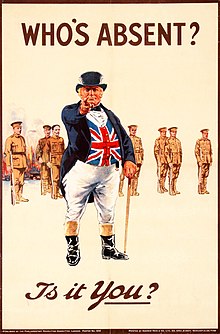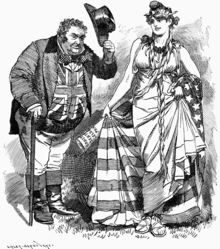John Bull
In this satirical treatment of the War of the Spanish Succession, John Bull brings a lawsuit against various figures intended to represent the kings of France (Louis Baboon) and Spain (Lord Strutt), as well as institutions both foreign and domestic.
Unlike Uncle Sam later, he is not a figure of authority but rather a yeoman who prefers his small beer and domestic peace, possessed of neither patriarchal power nor heroic defiance.
[1] Washington Irving described him in his chapter entitled "John Bull" from The Sketch Book: ...[A] plain, downright, matter-of-fact fellow, with much less of poetry about him than rich prose.
He excels in humour more than in wit; is jolly rather than gay; melancholy rather than morose; can easily be moved to a sudden tear or surprised into a broad laugh; but he loathes sentiment and has no turn for light pleasantry.
He is a boon companion, if you allow him to have his humour and to talk about himself; and he will stand by a friend in a quarrel with life and purse, however soundly he may be cudgelled.The cartoon image of stolid, stocky, conservative and well-meaning John Bull, dressed like an English country squire, sometimes explicitly contrasted with the conventionalised scrawny, French revolutionary sans-culottes Jacobin, was developed from about 1790 by British satirical artists James Gillray, Thomas Rowlandson and Isaac Cruikshank.
A more negative portrayal of John Bull occurred in the cartoons drawn by the Egyptian nationalist journalist Yaqub Sanu in his popular underground newspaper Abu-Naddara Zarqa in the late 19th and early 20th centuries.
[6] Sanu's cartoons depicted John Bull as a coarse, ignorant drunken bully who pushed around ordinary Egyptians while stealing all the wealth of Egypt.
For shirking his part in the patriot game.Increasingly through the early twentieth century, John Bull became seen as not particularly representative of "the common man," and during the First World War this function was largely taken over by the figure of Tommy Atkins.
[1] A typical John Bull Englishman is referenced in Margaret Fuller's Summer on the Lakes, in 1843 in Chapter 2: "Murray's travels I read, and was charmed by their accuracy and clear broad tone.




